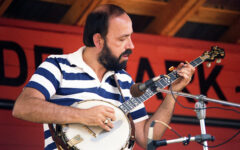
 It’s hard to know what to say about legends in our industry. Accurately describing the importance of their contributions – and lifetime commitment – to bluegrass and traditional music is nearly impossible. This evening, one of the true founding fathers of this seventy-some year old musical genre, the International Bluegrass Hall of Honor and Grand Ole Opry member Ralph Edmund Stanley, has passed. He was 89 years of age and his family has indicated that he passed peacefully in his sleep after suffering from skin cancer.
It’s hard to know what to say about legends in our industry. Accurately describing the importance of their contributions – and lifetime commitment – to bluegrass and traditional music is nearly impossible. This evening, one of the true founding fathers of this seventy-some year old musical genre, the International Bluegrass Hall of Honor and Grand Ole Opry member Ralph Edmund Stanley, has passed. He was 89 years of age and his family has indicated that he passed peacefully in his sleep after suffering from skin cancer.
His musical importance cannot be overemphasized. Stanley was one of the few artists of any genre whose music had a significant impact on several generations of listeners. While some will remember the legacy of his work alongside his late brother, Carter Stanley, from the mid-1940s through the mid-1960s, others discovered Stanley’s music more recently, as his associations with the folk and Americana world grew thanks to the O Brother Where Art Thou soundtrack and work with Jim Lauderdale, among others. Still yet another group of fans will remember him most vividly from the early decades of his solo career, when alongside Roy Lee Centers, Curly Ray Cline, Jack Cooke, and others, he churned out album after album of mountain-tinged bluegrass, forever associating songs like Little Maggie, Pretty Polly, and Clinch Mountain Backstep with the Stanley name and sound.
Much of Stanley’s story has become part of the story of bluegrass, and as such, is well-known by even more casual fans. Born in 1927 in Big Spraddle Creek, Virginia, located in the far southwest corner of the state in Dickenson County, his mother Lucy taught him to play clawhammer style banjo when he was a young teenager. Older brother Carter was musically gifted as well, and upon Ralph’s discharge from the United States Army in 1946, the two joined together and began playing their own version of Bill Monroe’s recently created bluegrass music (though it wouldn’t be called that for at least another decade) on local and regional radio stations. Together, the Stanley Brothers helped form a sound that would ultimately become a style all its own – the Clinch Mountain sound.
 Though Carter’s excellent songwriting and smooth lead vocals formed a core part of the Clinch Mountain sound, its difference from the music being played by Monroe, Flatt & Scruggs, and other contemporaries arguably stemmed from Ralph. His driving, arpeggiated banjo style, led with the index finger instead of the thumb, and now known widely as “Stanley style,” was (in the minds of many) as important to the development of bluegrass as the banjo itself. His singing, too, long set him apart from other bluegrass artists. For many years, he spoke of singing in the old-time mountain way. Influenced by his upbringing in the Primitive Baptist Church, both his lead and tenor vocals carried a sense of mournfulness and were different from other artists of the day. He brought unadorned Gospel music to bluegrass, recording many of the mountain hymns he grew up singing, such as Bright Morning Stars. He became strongly identified with this sound, in part thanks to the chilling, a capella rendition of O Death that became his trademark song in recent years.
Though Carter’s excellent songwriting and smooth lead vocals formed a core part of the Clinch Mountain sound, its difference from the music being played by Monroe, Flatt & Scruggs, and other contemporaries arguably stemmed from Ralph. His driving, arpeggiated banjo style, led with the index finger instead of the thumb, and now known widely as “Stanley style,” was (in the minds of many) as important to the development of bluegrass as the banjo itself. His singing, too, long set him apart from other bluegrass artists. For many years, he spoke of singing in the old-time mountain way. Influenced by his upbringing in the Primitive Baptist Church, both his lead and tenor vocals carried a sense of mournfulness and were different from other artists of the day. He brought unadorned Gospel music to bluegrass, recording many of the mountain hymns he grew up singing, such as Bright Morning Stars. He became strongly identified with this sound, in part thanks to the chilling, a capella rendition of O Death that became his trademark song in recent years.
Since the year 2000 and the release of the film O Brother Where Art Thou, Stanley’s career had enjoyed a new illumination. The movie’s hugely popular soundtrack, which earned Stanley a Grammy thanks to his contribution of O Death (a new cut of a song he had originally recorded as part of the Stanley Brothers), brought his music to an entirely new audience. During the same time, Stanley ensured that the Clinch Mountain sound was also passed down to new generations of his family, as son Ralph Stanley II moved on from the Clinch Mountain Boys to front his own band, and grandson Nathan Stanley performed as part of the Clinch Mountain Boys for several years, as well.
 You could spend hours listing all the awards Stanley won over the course of his seventy-year career as a professional musician. Grammies, IBMA awards, Halls of Fame, a National Heritage Fellowship in the 1980s, the National Medal of Arts in 2006. The well-known honorary doctorate from Lincoln Memorial University, lending him the moniker of Dr. Ralph Stanley since 1976, as well as the more recent honorary doctorate from Yale University in 2014. You could talk all day about his signature songs, spend weeks listening to the albums he has recorded or contributed to. Though it wasn’t without its share of hard times and struggles, Stanley lived a life that was completely full of the music he loved.
You could spend hours listing all the awards Stanley won over the course of his seventy-year career as a professional musician. Grammies, IBMA awards, Halls of Fame, a National Heritage Fellowship in the 1980s, the National Medal of Arts in 2006. The well-known honorary doctorate from Lincoln Memorial University, lending him the moniker of Dr. Ralph Stanley since 1976, as well as the more recent honorary doctorate from Yale University in 2014. You could talk all day about his signature songs, spend weeks listening to the albums he has recorded or contributed to. Though it wasn’t without its share of hard times and struggles, Stanley lived a life that was completely full of the music he loved.
The lines of one of Stanley’s most iconic numbers ask, “Will you miss me when I’m gone?” Yes, we will miss him. We’ll miss the stoic figure on stage, hands clasped at his waist, preparing to sing the sorrowful lines of Man of Constant Sorrow. We’ll miss the crack of his arch top banjo, kicking off Clinch Mountain Backstep or switching to clawhammer style for some of our favorite tunes. We’ll miss that Clinch Mountain sound. Like all legends, however, his memory and legacy will continue through the many lives he has touched, from former and current Clinch Mountain Boys to fans alike. Thankfully, his musical legacy will live on through Ralph II’s leadership of the Clinch Mountain Boys, and the hundreds of Stanley songs that have become standards at back porch jams, on new recordings, and at concerts every day.
R.I.P., Ralph Stanley.







